
Manchester, 6 November 2025 — Findel, the education partner behind Hope Education, GLS, Philip Harris, Davies Sports and EuHu, welcomes the Government’s direction on curriculum and assessment reform and is setting out clear, practical support so schools can turn policy into positive learning outcomes.
Chris Mahady, Chief Executive Officer, Findel Group, said: “This is about helping teachers teach and pupils learn. We will focus on what matters most in classrooms: science practicals, confident reading and speaking, fair and manageable assessment, and ready to use tools so schools feel prepared from day one.”
The changes that will matter most in classrooms
- Triple science entitlement at GCSE (accepted by Government)
Pupils who want to study biology, chemistry and physics separately should be able to. This is a significant step for choice and progression, particularly for pupils aiming for STEM routes. The challenge will be staffing and lab time, especially in physics. - Earlier checks to boost GCSE readiness (English accepted; maths proposed)
A new Year 8 diagnostic reading test (and a proposed maths equivalent) will help identify gaps before Key Stage 4 so interventions can happen sooner and with greater precision. - Stronger speaking and listening (new oracy framework proposed)
Primary and secondary frameworks for oracy will place structured speaking and listening alongside reading and writing, improving confidence, classroom participation and attainment across subjects. - Fairer, more manageable assessment (proposal to reduce GCSE exam time by 10% or more)
Reducing overall exam time should ease pressure on pupils and timetables while keeping standards high. - Richer experiences for every child (core enrichment entitlement accepted)
All pupils should access enrichment across five areas: civic engagement, arts and culture, nature and adventure, sport and life skills. - Curriculum breadth and parity (English Baccalaureate to be scrapped as a headline measure, accepted)
Ending the English Baccalaureate as a headline accountability metric should reduce unhelpful narrowing and allow schools to balance academic, creative and vocational routes. - Inclusion and representation (proposals)
Plans include more accessible primary tests for pupils with SEND, stronger KS1 writing fluency assessment, and a review of subject content to reflect the diversity of modern Britain. Religious education may be brought into the national curriculum, and a new modern foreign language qualification is being explored to “bank progress”.
Timing: the revised curriculum is due in spring 2027, with first teaching from September 2028, giving schools roughly four terms to prepare. Some accepted changes (for example, removal of the EBacc headline measure) may phase in earlier.
What this means for educators
- Science first: timetable modelling, technician time and equipment planning will be critical in schools offering triple science widely.
- Targeted intervention: Year 8 diagnostics will only help if there is a clear workflow from results to resources to tracked progress.
- Every voice heard: oracy needs shared routines, simple rubrics and consistency across subjects to stick.
- Workload and fairness: shorter exams and clearer assessment maps should reduce pressure; departments will still need to resequence curricula.
- Equity by design: SEND accessibility and representative content are not optional extras; they need to be embedded in schemes of learning and resource choices.
How Findel will help schools feel ready
- Triple science at scale (Philip Harris): fully costed lab ready kits, practical schedules, technician guidance and safety documentation; CPD webinars and sequencing maps for schools with limited lab capacity.
- Diagnostics to action: simple pathways from Year 8 reading (and proposed maths) diagnostics to intervention, with bundled resources, progress trackers and review points aligned to departmental cycles.
- Oracy made routine: ready to teach oracy packs for primary and subject specific secondary routines, with sentence stems, discussion protocols and quick check rubrics.
- Enrichment, simplified: off the shelf bundles mapped to the five entitlement areas, plus planning templates, risk assessments and impact logs to evidence participation.
- Inclusion and representation: curated resource lists and adaptations for pupils with SEND, alongside practical guidance for more representative curriculum content.
- Time saving planning tools: editable schemes of learning, assessment maps, timetable stress tests and moderation packs to help middle leaders land change quickly and consistently.
Natalie McMunn, Head of Schools Business Unit, Findel, added: “Leaders tell us they want clarity and resources that work first time. Our role is to remove friction so teachers can spend more time teaching and pupils can make faster progress.”
What schools can do now
- Run a science readiness check: staffing, lab timetable, equipment and budget scenarios for triple science.
- Agree your diagnostics workflow: who does what, by when, and which resources are used at each threshold.
- Pilot oracy in one year group per key stage: build habits and exemplars this year, then scale next year.
- Audit enrichment and inclusion: map current provision to the five entitlement areas and identify gaps; review schemes for accessibility and representation.
- Build a four term plan to September 2028: milestones for curriculum maps, resources, CPD, assessment and communication with families.
About Findel
Findel partners with educators to build classroom confidence and better outcomes. Through Hope Education, GLS, Philip Harris, Davies Sports and EuHu, we provide curriculum ready resources, practical CPD and planning tools that turn policy into progress.
